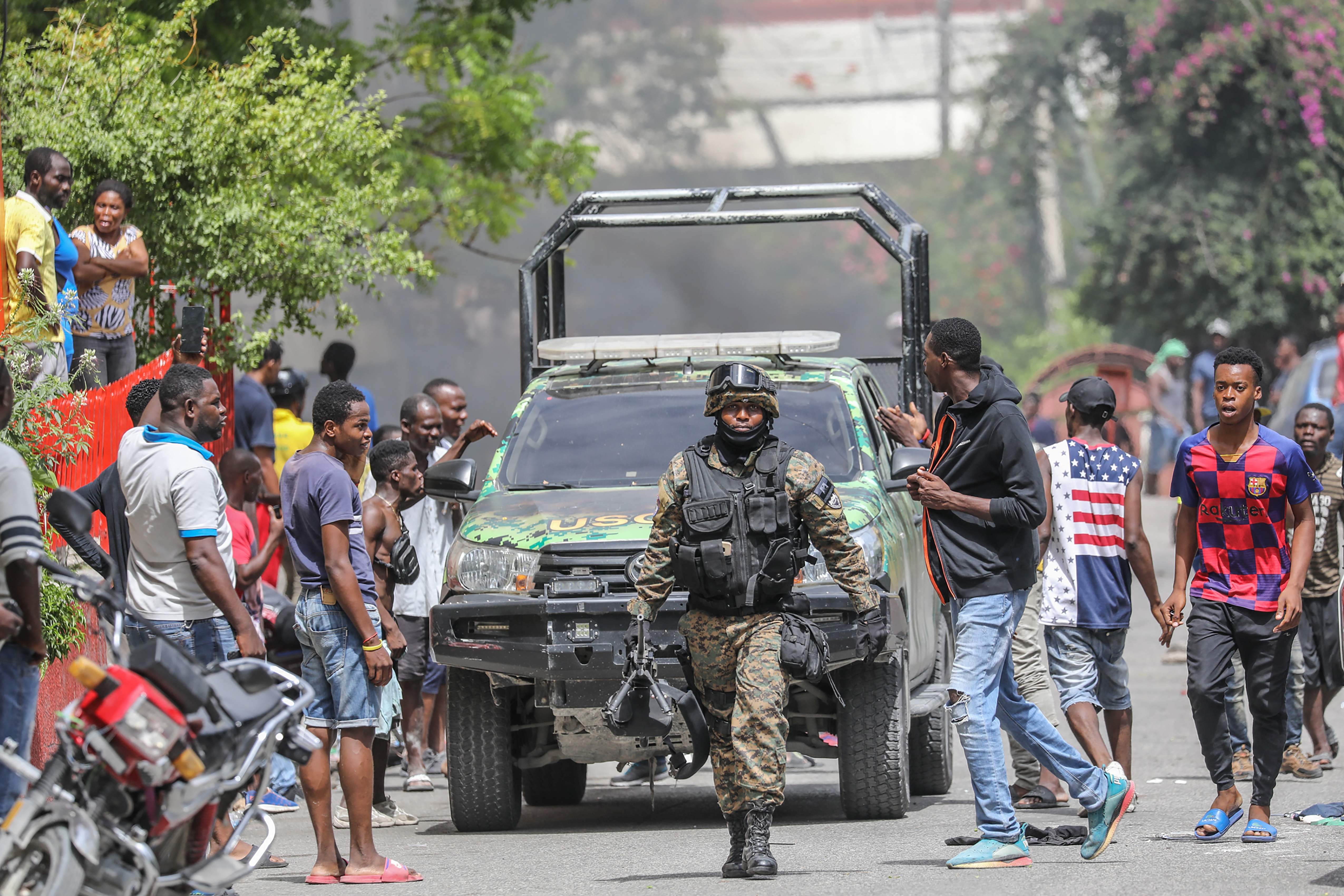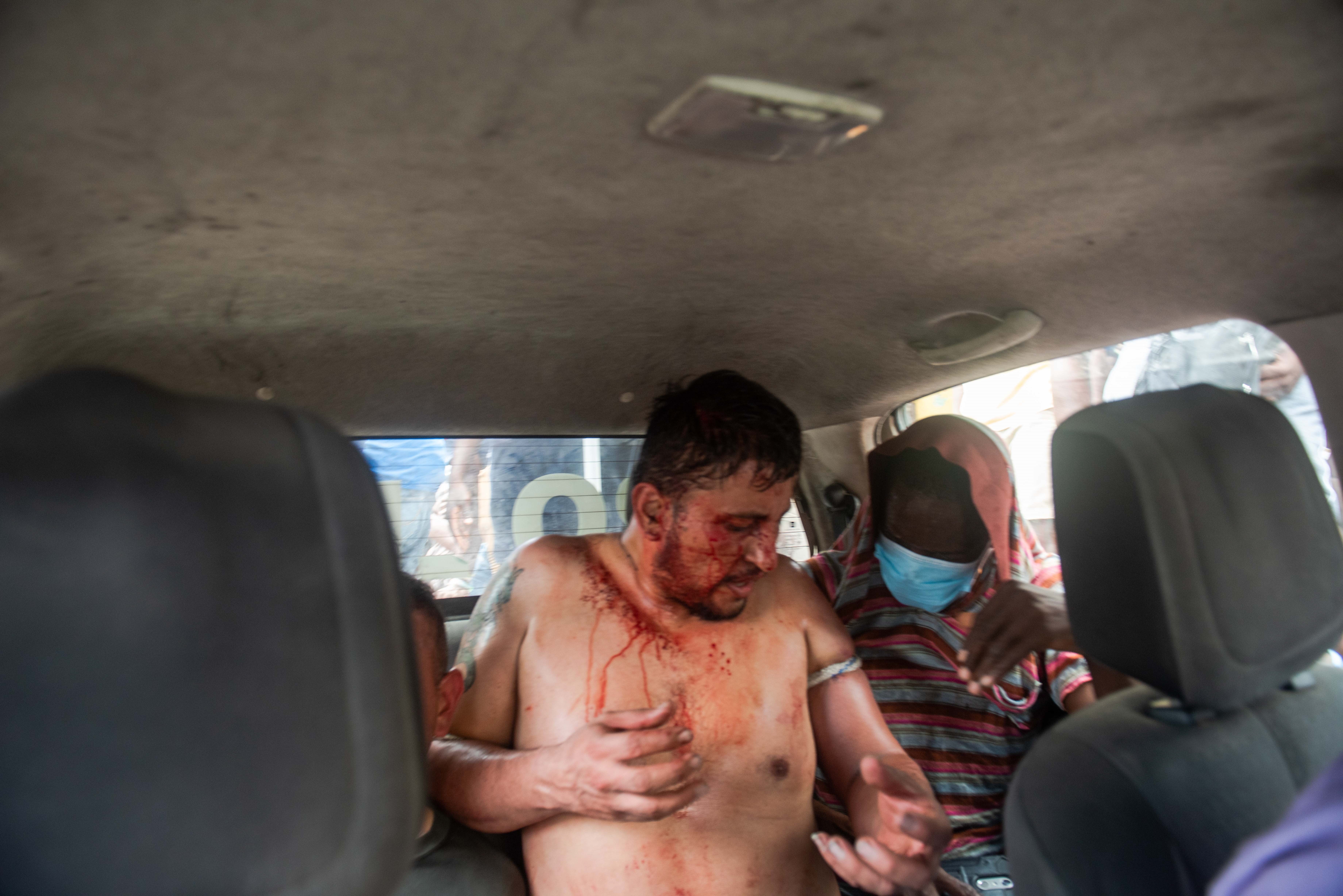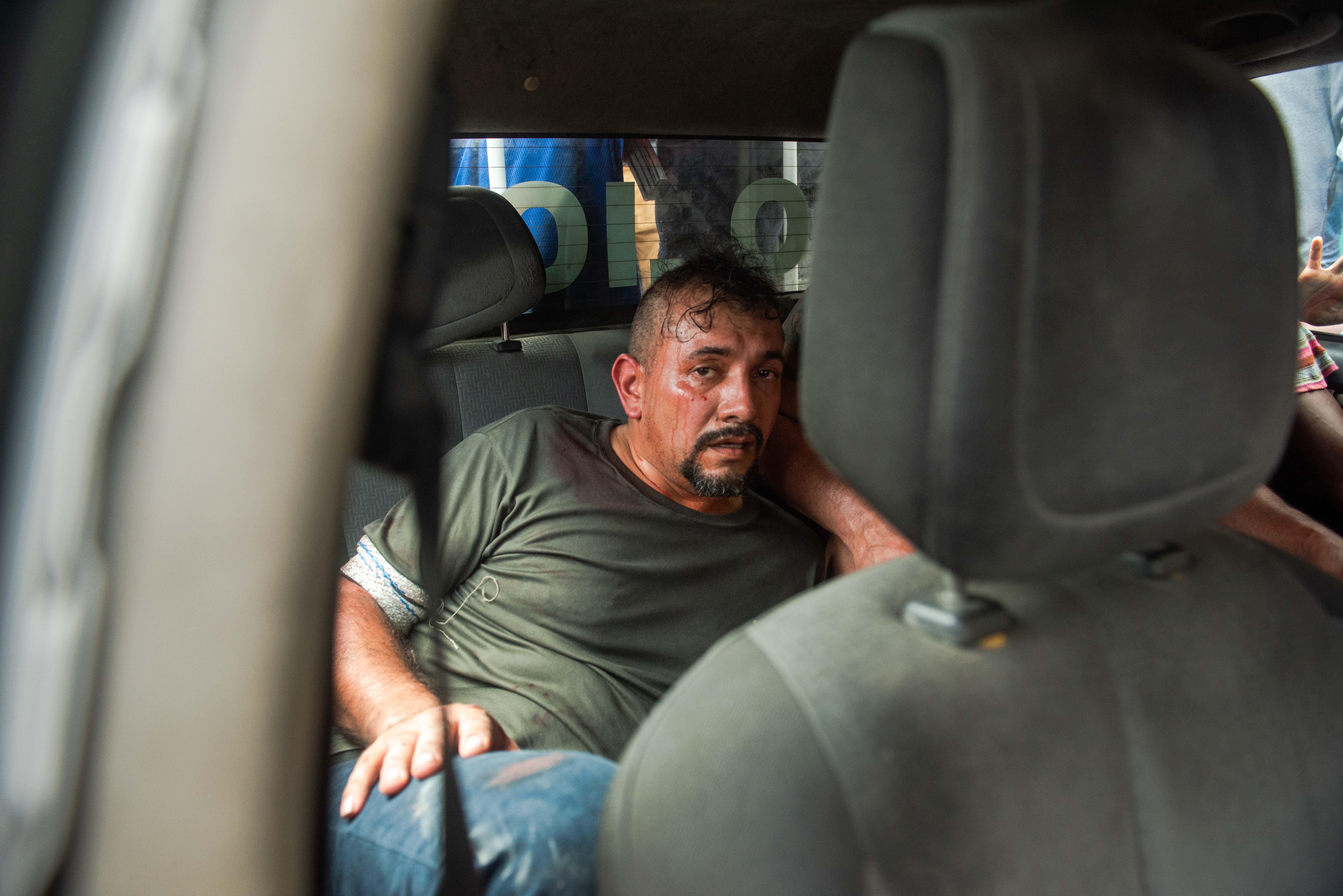Everything we know about the assassination of Haiti President Jovenel Moïse
Assassins described as foreign commandos claiming to be US agents throw the country and its leadership into chaos

The president of Haiti was assassinated and his wife wounded in a "well-coordinated" attack at their home in the Caribbean Island’s capital of Port-au-Prince.
Gunmen raided the home during the early hours of the morning, throwing the country’s leadership and upcoming presidential elections into chaos.
While details continue to emerge amid the "state of siege", this is everything currently known about the dramatic murder of a head of state.
US citizen among suspects in custody following shoot out
Four "foreign mercenaries" were killed and two captured after a shootout in the streets of Haiti less than 24 hours after the country’s leader was assassinated.
Haiti’s minister of elections and inter-party relations, Mathias Pierre, identified US citizen James Solages, who is described as being of Haitian descent, as one of the six people “arrested” in interviews with both The Washington Post and The New York Times. He told the Post that at least one other detainee is also believed to be a Haitian American.
While a Facebook page of James Solages from Fort Lauderdale has been removed, Heavy.com pulled detail from the search thumbnail to report that he was the same Mr Solages identified by Haiti officials.
Photos of two survivors from the police shootout that were arrested don’t appear to show a resemblance to the public profile of Mr Solages from South Florida, although four additional gunmen were killed by police.
Haiti officials said six of the group were "arrested" but were not clear on whether that that included the two taken into custody alive and the four killed by police in the shootout.
A biography from a non-profit operating in Haiti describes Mr Solages as president of its board of directors who was previously "chief commander of bodyguards for The Canadian embassy in Haiti".
It says he serves as a politician promoting his country through economic development programs while working as a corporate executive in South Florida.
Mr Pierre reportedly showed a video of the two suspects being arrested to the jeers of a surrounding mob, while the crowd surrounded the police station where they were held.
“The special units are trying to protect the police station, because the population is very mad and is trying to get to them, to burn them,” he told the Post. “We’re trying to avoid that.”
While the two men were photographed begin taken into custody, it was not immediately clear which was Mr Solages and which was the unidentified foreigner believed to be Haitian American.

Léon Charles, chief of Haiti’s National Police, said police chased the attackers as they left the crime scene and had been battling them since they were cornered in a nearby house.
Three officers held hostage were released after police surrounded and cleared the suspected hideout.
Those killed and captured were not identified and evidence of their links to the assassination have yet to be released, while more attackers are believed to be at large.
“We will continue to hunt them down. Either they will be arrested, or they will be stopped in the exchange of fire. The pursuit will continue," Mr Charles said at a press conference.
While Mr Charles and the country’s prime minister called the "highly-trained commando" foreigners that spoke Spanish, the country’s Minister of Culture and Communication Pradel Henriquez said there were Haitians among the group of attackers, according to Haiti’s French-language newspaper Le Nouvelliste.

The president was assassinated, while the first lady survived her wounds
President Jovenel Moïse, 53, was shot 12 times and his left eye “blown out” in the attack. First lady Martine Moïse was shot but survived.
Judge Carl Henry Destin, the deputy justice of the peace of Pétion-Ville, told Haiti’s French-language newspaper Le Nouvelliste that Mr Moïse’s body was found riddled with a dozen bullet wounds made by a large-calibre weapon and 9 mm firearms.
“We found him lying on his back, blue pants, a white shirt stained with blood, his mouth open, his left eye gouged out,” Mr Destin said.
“We saw a bullet impact at the level of his forehead, one in each nipple, three at the hip, one in the abdomen.”
Mr Destin told the newspaper that the president’s office and bedroom were ransacked while his daughter, Jomarlie Jovenel Moïse, hid in her brother’s bedroom during the attack.
An unidentified boy in the house and a maid were tied up by the attackers. Ms Moïse survived and was evacuated to Miami’s Ryder Trauma Center, where she remained stable.
The president is survived by his wife three children.

How the president was assassinated
Mr Moïse had a private security detail and it is unknown how the attackers entered the home about 1 am local time on the morning of Wednesday, 7 June.
Mr Destin said members of the commando team shouted "DEA operation" as they entered the residence, while there was evidence of a gun battle on the property.
"Many 5.56 and 7.62 mm cartridge cases were found between the gatehouse and the interior of the residence," Mr Destin said.
Images and video from the scene showed concrete walls and car windows riddled with bullet holes, while witnesses said the shooting continued for about 30 minutes and included "explosions.
The neighbourhood, Pelerin 5, rests atop the hills overlooking Port-au-Prince, about an hour’s drive, or 16.2 kilometres from the capital city.
The suspected shooters were intercepted leaving the scene, with "some" taking refuge in the Pèlerin neighbourhood, according to Mr Charles.
Gunmen were ‘well-trained killers’
Haiti’s envoy to the US said the assassination was carried out by foreigners who were "well-trained professionals, killers, commandos” while the country’s Prime Minister Dr Claude Joseph said they were an unidentified group of individuals, "some of whom were speaking in Spanish".
Mr Joseph’s cryptic reference to Spanish-speaking attackers came amid reports of video footage showing the men claiming to be agents with the US Drug Enforcement Administration (DEA).
The national language of the country is Haitian Creole, similar to French-based Creole, with influences from Spanish, Portuguese and English. Spanish is spoken in the neighbouring Dominican Republic.
“DEA operation. Everybody stand down. DEA operation. Everybody back up, stand down,” one of the men with an American accent is said to have yelled in English.
Footage filmed in the dark of night showed flashlights illuminating parts of the property as one of the men uses a megaphone while speaking in English and a different language.
A translation of the footage online showed the men yelling in a different language, "You guys better not shoot. Don’t shoot at the men, the men are not your enemy," before returning to an American accent.
This is an operation, this is an operation, DEA. Everybody go go go, continue, go, everybody, do not shoot".
Back to another language: "Guys if you do not leave the operators will shoot at you guys… Guys, keep walking down. If you don’t keep walking down they will shoot at you."
The men filming the footage comment that the attackers disarm security before saying "the president is gone".
Ambassador Bocchit Edmond said at a press conference they were “fake DEA”, based on his impression from security camera footage.
Department of State spokesman Ned Price denied the US had any involvement in the murder.
“The Hattian ambassador himself has dismissed these allegations, these reports are absolutely false, the United States condemns this heinous act, these false reports are nothing more than that, false reports,” Mr Price told a news briefing.
Where the investigation stands
The interim prime minister Claude Joseph called for an international investigation and alluded to the political enemies of Mr Moïse that could be behind the hit squad.
He told the Associated Press the president as a " man of courage″ who opposed ’’some oligarchs in the country, and we believe those things are not without consequences.″
Authorities closed the international airport and other ports of entry to prevent the escape of the attackers as the country was declared a “state of siege”, with businesses in the area ransacked following news of the assassination.
Mr Edmond told reporters they had formally asked for assistance with the investigation.
Mr Price, the State Department spokesman, said they also expect to receive a formal request for defence equipment and were standing by.
"The investigation is in the early phases, we are ready and willing to support Hattian authorities in that investigation, which they are leading," Mr Price said. "We are willing to cooperate with any requests they may put forward."

Leadership chaos as incoming prime minister declares interim prime minister illegitimate
The country’s interim prime minister Claude Joseph has assumed leadership of Haiti, placing police and military in control of security.
The long-term line of succession, however, remains unclear.
A day before his assignation, Mr Moïse had named a new prime minister, Dr Ariel Henry, to replace the interim office holder, Mr Joseph.
Mr Henry told Le Nouvelliste that he is, in fact, the legitimate prime minister and that Mr Joseph was to remain in government under his leadership
“It is necessary to sit down. I am an appointed Prime Minister, Claude was an interim Prime Minister who resumed his positions as Minister of Foreign Affairs. I think we need to talk to each other. Claude was supposed to stay in the government I was going to have," he said.
“In my opinion, he is no longer Prime Minister. Are there several Prime Ministers appointed in the country?"
Whoever the prime minister is, to formally replace the late president as the country’s leader they would have to be approved by the country’s parliament, but that it is effectively defunct
President of the National Association of Haitian Judges, Jean Wilner Morin, told CNN the president of the Supreme Court normally next in line was empty after the death of the current holder from Covid-19.
"So we are in a situation today where we have two Prime Ministers. One Prime Minister who is in office, and another one legally appointed by the President of the Republic. So which of these two Prime Ministers should take the reins of the country?" Ms Morin told CNN.
She said there was a third scenario in which the President of the National Assembly replaced the president in 2015.
"Today we don’t have a President of the National Assembly, but there is still a third of the Senate in Parliament and the third of the Senate is presided over by a former senator, named Joseph Lambert," she added.
Mr Henry said that he is in contact with the 10 senators still holding office, as well as "people in the international community", about the line of succession.

The broader context preceding the assassination
The country of roughly 11 million people has battled poverty, crime, corruption and natural disasters, from hurricanes to earthquakes.
Mr Moïse, a former banana producer, was sworn into office in 2017 after the nation had been leaderless for a year on the promise of fighting corruption.
He had been widely criticised for ruling by decree for almost two years while the Parliament was dissolved a year ago amid failure to hold elections.
Protesters had been calling for his removal since 2019, while opposition leaders accused him of increasing his power by approving by staying in office after the end of his term in February 2021 and signing decrees to squash dissent.
One decree limited the powers of a court that audits government contracts while another created an intelligence agency that answers only to the president.
The next elections are scheduled for September.

Biden calls assassination ‘heinous’
US President Joe Biden condemned the attack as “heinous” in a statement and said it was “very worrisome”.
Asked by reporters for his response as he left for a trip to Illinois, he said they "need a lot more information, but it’s just – it’s very worrisome about the state of Haiti”.
Mr Biden’s formal statement from the White House released earlier said: "We are shocked and saddened to hear of the horrific assassination of President Jovenel Moïse and the attack on First Lady Martine Moïse of Haiti. We condemn this heinous act, and I am sending my sincere wishes for First Lady Moïse’s recovery. The United States offers condolences to the people of Haiti, and we stand ready to assist as we continue to work for a safe and secure Haiti."
“The United States offers condolences to the people of Haiti and we stand ready to assist as we continue to work for a safe and secure Haiti,” said President Biden.
Additional reporting by the Associated Press
Join our commenting forum
Join thought-provoking conversations, follow other Independent readers and see their replies
Comments
Bookmark popover
Removed from bookmarks